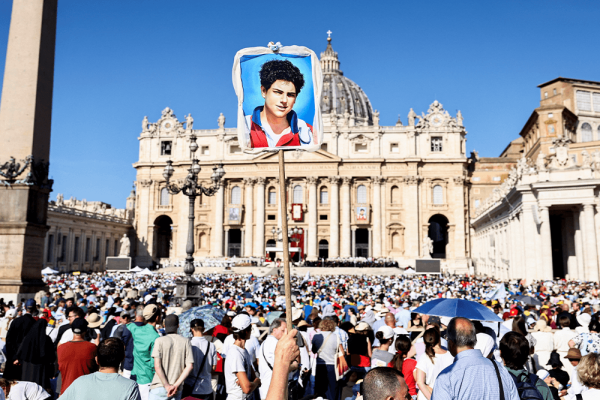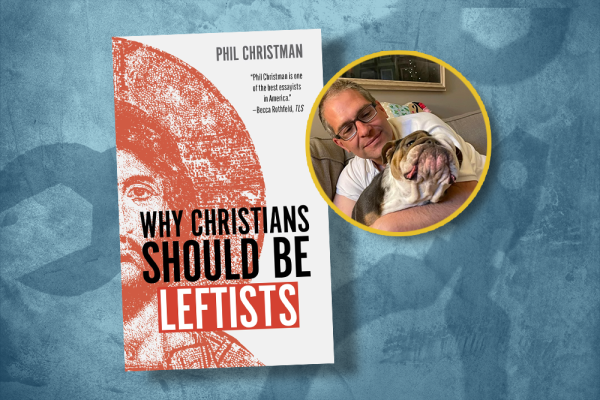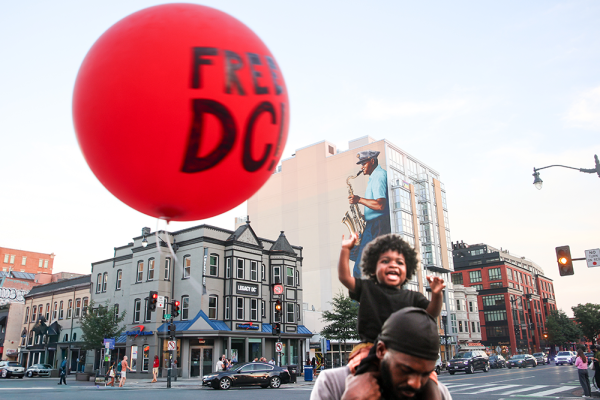As part of the ongoing assault on essential services for the most vulnerable, the One Big Beautiful Bill Act, signed into law on July 4, includes $1 trillion in cuts to Medicaid over the next 10 years. As Emily Crawford noted for NPR in August, “The Congressional Budget Office estimates that these cuts could cause 10 million Americans to lose health insurance by 2034.”
As a caregiver for my disabled mother, who relies solely on Medicaid for health insurance, these estimates are terrifying. Also terrifying is that House Speaker Mike Johnson, the Louisiana Republican and Christian, gave glory to God when the bill that created these cuts was passed.
A teenager who died of leukemia in 2006 became the first Catholic saint of the millennial generation on Sunday, in a Vatican ceremony led by Pope Leo XIV and attended by an estimated 70,000 young worshippers from dozens of countries.
Carlo Acutis, a British-born Italian boy who died aged 15, learned computer code to build websites to spread his faith. His story has drawn wide attention from Catholic youth, and he is now at the same level as Mother Teresa and Francis of Assisi.
Leo, the first U.S. pontiff, canonized Acutis on Sunday along with Pier Giorgio Frassati, a young Italian man who was known for helping those in need and died of polio in the 1920s.
This interview is part of The Reconstruct, a weekly newsletter from Sojourners. In a world where so much needs to change, Mitchell Atencio and Josiah R. Daniels interview people who have faith in a new future and are working toward repair. Subscribe here.
I’m going to let you in on a little secret: If you see a book about politics published in 2025, it’s very possible the world is different than what the author hoped for when they pitched it.
In many headlines and on social media, the term “evangelical” is often conflated with “conservative,” “white,” “male,” and “American.” Many in the U.S. evangelical community are resisting that conflation, actively pushing for a new vision for evangelicalism that situates it within a global landscape. For these evangelicals, the future of evangelicalism is less James Dobson and more Botrus Mansour.
As such, Christianity Today often uplifts the multicultural face of global evangelicalism, suggesting that decentering the white American experience offers a new path forward for evangelicalism. Hence, the oft spoken refrain: The new face of Christianity is not a white man, but a woman in Africa.
So many of us have spiritual longings and progressive ideals that have not been fulfilled in our church. And so we seek. We often bounce around from church to church. We explore mindfulness, meditation, self-help, and countless other things. We may have lost track of how many books and seminars we have taken in. If you have been searching, looking for inner peace and healing, wanting to ditch the guilt and fear, yet also wanting to remain centered on Jesus and God, you may consider exploring A Course in Miracles.
Why is it that, in our current era, the most emotionally resonant art often lurks behind the silliest premise? It has become something of a running joke in the rapidly emerging KPop Demon Hunters fan community that the movie, on the basis of the title alone, is incredibly difficult to recommend to people without being laughed off. KPop Demon Hunters may have a campy hook, but it explores ideas that cut to the heart of human experience.
KPop Demon Hunters is about Huntr/x, a trio of Korean singers whose pop star status conceals their true role as mystical demon hunters tasked with creating a supernatural barrier called the Honmoon. Through the power of music, this Honmoon keeps soul-consuming demons at bay from the world. When the evil demon king Gwi-Ma sends a demon boy band called the Saja Boys to fight fire with fire (or pop song with pop song,) our heroes’ defense against the demon army begins to break. And the darkest secret? Rumi, the group’s lead singer and the film’s protagonist, is actually part-demon herself.
When President Donald Trump announced a takeover of the nation’s capital in August, he justified the move by claiming that crime in Washington, D.C., was rampant. It wasn’t.
Many videos have surfaced on social media depicting law enforcement officers from multiple agencies targeting predominantly Black and brown neighborhoods while outraged bystanders berate the officers.
Shortly after Hamilton was first released a decade ago, I found myself singing along to it rather loudly while building a new IKEA bed frame in a group house I had just founded.
As I belted out the words to one of the more familiar songs from Act 1, “My Shot,” my new housemate poked her head around the corner and added her own voice to the mix. “I’m just like my country / I’m young, scrappy and hungry,” we sang in unison, creating a moment of joy and connection between a Catholic and a Protestant that provided the foundation for a lasting friendship and community-building work.
“At their best, my videos are life-changing,” CJ The X tells me, with a laugh that acknowledges the immensity of the claim. From the mouths of many other internet creators, this statement might sound ludicrous—but the comments on CJ’s channel will reveal that they are not exaggerating.
“Every CJ The X video gives me about 5 metaphysical panic attacks before giving me some sort of closure,” one commenter remarked.
If you’ve ever attended a Christian music concert, you’ll likely remember the mid-concert missions pitch. Growing up in the evangelical tradition, I heard countless versions of this pitch from local nonprofit leaders admonishing us to give to their organizations. But there is one pitch I’ll never forget.
In high school, I went to see Remedy Drive at a small music venue in Northeast Wisconsin. At the time, they were a larger-than-life band with songs like “Daylight” and “All Along” topping the Christian music charts. The concert lived up to the expectation as their long-haired frontman, David Zach, danced around the stage, jumping off speakers and spraying water into the crowd.






